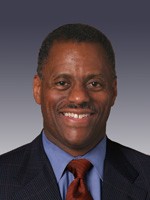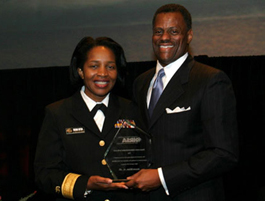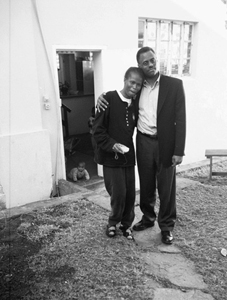Alumnus/Alumna of the Month

Jesse Milan Jr. ’81
Read an Interview with Jesse Milan Jr.
Jesse Milan is vice president for the Center for Global Health Convergence of Constella Health Sciences, a provider of health and biomedical research support services. In this position, he fosters public-private partnership opportunities for Constella in domestic and international arenas.
Prior to this position, Milan served as vice president of Constella's Health Communications Division because of his broad management, public health, and community-based experience. Milan became associated with Constella in 1997, and was hired in 1998 to serve as project director for the five-year National Prevention Information Network (NPIN) initiative, a contract with the Centers for Disease Control and Prevention (CDC) that Constella won with Milan's help.
Milan has served in many levels of the public health service continuum. In 2003, he was appointed by the US Secretary of Health and Human Services as co-chair of the newly created CDC/HRSA Advisory Committee on HIV and STD Prevention and Treatment. Before joining Constella, he was director of the AIDS Office for the City of Philadelphia Department of Public Health, where he was responsible for an annual budget in excess of $21 million. He also served as Health Department co-chair of the Philadelphia HIV Community Planning Group, chair of the Philadelphia Ryan White Title I Planning Council, and as president of the boards of four different nationally recognized HIV/AIDS organizations. Milan is a regular lecturer on an international level on public health policy issues including many live television, radio, and Voice of America appearances. Since 1998, he has completed seven tours to eight different African nations at the request of the US State Department, USAID, and the CDC to promote HIV/AIDS awareness and program development.
Milan served for six years as chief of staff to the president of Temple University and for two years as associate university counsel. He began his legal career as a labor law attorney at the renowned law firm of Morgan, Lewis and Bockius in Philadelphia. He served for four years in the City Solicitors Office for the City of Philadelphia. As deputy city solicitor and at Temple University, Milan developed important new policies on HIV/AIDS.
Milan has been honored numerous times for his public service, most recently in 2004 by the federal Health Resources Service Administration (HRSA), “for his exceptional leadership and strong personal commitment in leading the national and international fight against HIV disease.”
Interview with Alumnus/Alumna of the Month
Jesse Milan Jr. ’81
What is your area of specialization and how did you come to be involved in this field?
When I was in active practice, I specialized in labor law and general litigation. I come from a strong family history of civil rights advocacy. My father was the first African American public school teacher in Kansas, where I grew up, and he is currently President of the state chapter of the NAACP. Though I originally intended to concentrate on entertainment law, I found at NYU that I was drawn to labor law and employment discrimination, because commitment to civil rights is simply part of who I am. After graduation, I worked for Morgan, Lewis and Bockius in Philadelphia, which has one of the nation’s leading labor law practices. I continued in that area of specialization in the Philadelphia City Solicitor’s Office and as associate counsel at Temple University. Over the years, my commitment to civil rights has evolved to incorporate work in gay and lesbian rights, as well as anti-stigma and discrimination against persons with HIV/AIDS. My career is now in the field of public health, which involves a wide variety of legal, policy and civil rights issues at local, national and international levels, including addressing health disparities between the races, and promoting access to healthcare and health information.
What is the mission of the Constella Group?
Constella Group is a private business exclusively committed to enhancing human health through innovative science, technology, and knowledge solutions. It surprises people to learn that the federal government outsources many aspects of its public health work, including programs providing health information to the public. These services include development of health-related web sites, databases, fact sheets, 1-800 toll-free information services, health campaigns, outreach, technical assistance, research administration, grant award processes, epidemiology and statistical analysis, community capacity building and many others. Constella has provided all of these and many other services for over 20 years. As a private business, we serve as a contractor to leading federal health agencies, such as Centers for Disease Control and Prevention and the National Institutes of Health, to pharmaceutical businesses, and more recently, to global agencies, such as the US Agency for International Development, which enables us to provide health-related services around the world.
Describe a situation that you worked on that you found particularly challenging or rewarding.
The federal government mandates direct community participation in determining how HIV/AIDS services will be established in state and local communities receiving federal funds. This process, known as community planning, requires state and local government receiving federal funds to establish planning bodies representative of the wide ranging constituencies impacted by HIV/AIDS, and to develop plans outlining service priorities and documenting and explaining how and why funds should be spent in that community. These plans are submitted to the federal government for competitive review against other cities and states seeking funds. With millions of dollars at stake, and with new HIV infections growing and AIDS deaths mounting, community planning activities, especially in the 1990s, often involved loud and intense advocacy (remember Act-Up?), competing interests, and meetings frequently degenerated into angry confrontations. As Director of the AIDS Office for the Philadelphia Department of Public Health (1995-1997), I was responsible for the community planning processes for both HIV/AIDS prevention services, and for treatment, care and support services. With so much at stake, I suffered, as did most big city AIDS directors, the brunt of relentless scrutiny and criticism from various constituencies ranging from City Council, to persons living with AIDS, to service providers. Those were very challenging times both professionally and personally. Yet, as a lawyer, I was deeply committed to insuring that our community planning process was fair and open, and that the priorities developed and adopted by our planning bodies would receive not only the support of the community, but would also result in increased funds for our region. I was thrilled when the priorities and plans developed during my tenure were fully supported by our planning bodies, and resulted in millions of new dollars for the prevention, treatment and care of HIV in the Philadelphia region.

Milan receiving the federal Health Resources Services Administration, HIV/AIDS Bureau Administrators Award in August 2004 for his exceptional leadership and strong personal commitment in leading the national and international fight against HIV disease.
More recently, Constella Group was contracted by the CDC’s Global AIDS Program to help establish the first national HIV/AIDS Resource Center in Ethiopia. The project was modeled after other programs we have run for the CDC, and included creating Ethiopia’s first national database of HIV services, a web site (www.etharc.org), and a comprehensive walk-in library of information in Addis Ababa. This was Constella’s first international effort, and required me, as Constella’s project director for this program, to figure out how to meet the challenges of hiring non-US citizens, create a new program in an unfamiliar country, work with a partner organization (Johns Hopkins School of Public Health), and overcome technological obstacles in a developing country. When the program was officially opened in 2002, I was unbelievably proud. The ribbon-cutting ceremony was attended by the US Deputy Secretary of Health and Human Services, and by three cabinet level ministers of Ethiopia. I would never have imagined when I first became involved in HIV/AIDS in 1985 that I would be sitting on foreign soil and having a positive impact on a different people and culture. It was very rewarding.
You have traveled through Africa and the US promoting health awareness and program development. How do attitudes in Africa differ from those in the US in terms of the stigma of living with HIV? Have these attitudes changed over the years that you’ve been involved in this field?
The stigma of HIV/AIDS in the US is rooted in the very nature of how HIV is transmitted—sex and drugs. HIV/AIDS is inextricably linked in the minds of many with the moral issues of homosexuality, promiscuity, and illegal drug use. This stigma exists across all racial groups in the US. Yet, Americans have learned much about ourselves from HIV/AIDS. The gay and lesbian community would not be so focused on marriage were it not for HIV/AIDS. We learned from AIDS that there is nothing worse than burying someone you love, and that our committed relationships have equal value to heterosexual marriages. We are showing the world that this is true and many heterosexuals have begun to agree. Americans have also learned much from HIV/AIDS about the psychological and physiological aspects of drug abuse, and about how inadequate parental concern can lead to adolescent sexual activity. America’s learning curve about these issues is heartening and the stigma of HIV/AIDS, while still widespread, is being more publicly addressed and in some places, more publicly abated.

Milan during his second HIV/AIDS speaking tour in Africa on behalf of the US State Department in 2002. He is pictured with a woman who is living with AIDS at a home for women and children with AIDS in Pietermaritzburg, South Africa.
At home and abroad, HIV/AIDS has exposed like never before the social and economic imbalance between men and women and the impact this age old imbalance has on the health of women and children. To address the stigma of HIV, Africans and Asians have to be willing to publicly address the roots of HIV transmission in their cultures, which I have found are in cultural expectations about sex and in the imbalance of power between the genders. Simply put, women in Africa and Asia lack inherent power within their relationships and within their cultures. In many cultures, men have culturally historic sexual license, they live under incredible pressures to procreate, and they also retain the bulk of economic power. Rather than assume that it is the man who is transmitting HIV (based on his personal sexual history), it is often assumed that it is the woman who has brought AIDS into the home. Therein lies the most heartbreaking aspect of HIV stigma in other countries. I hear over and over again in Africa how women simply do not have the option of demanding safer sex from men, because it implies that the woman has been unfaithful, and not the man. To make matters worse, a woman can get beaten or thrown out for asking her husband or boyfriend to wear a condom or to get an HIV test. This is just as true in South Chicago as it is South Africa. If you are a poor woman in a country with 40 % unemployment you may have no option at all but to submit to the will of the man who is providing for you and your children. This imbalance of power is compounded by cultural silence in many countries about rape and incest. Yet, Africans are also very socially conservative people. For them, talking about any of these issues is very difficult and painful, which further strengthens the stigma of HIV. Finally, after more than two decades into this pandemic, these long unspoken topics are being addressed publicly in Africa, and hopefully, the shame and stigma of HIV will begin to fade.
What legal decision in the US has had the greatest impact upon the personal and professional lives of people living with HIV?
Without question, the Supreme Court’s 1998 decision in Bragdon v. Abbott is the most important legal decision impacting persons living with HIV/AIDS in the US. In that decision, the Supreme Court made it absolutely clear that the Americans with Disabilities Act (ADA) does in fact cover HIV/AIDS, and that persons with HIV/AIDS can not be the subject of discrimination in employment or public accommodations. In reaching this decision, the court applied a thoughtful and reasoned test for assessing not only that people with HIV have an impairment in a major life function, but it also articulated that because of the ways HIV is transmitted, persons with HIV do not pose a “direct threat” to the health and safety of others in employment situations and public venues. This decision is a landmark for people with HIV/AIDS. However, it only applies to those employers and services that fall within the purview of the ADA. We still have to rely on state and local laws to govern smaller sized employers and other types of activities.
What is the most rewarding part of your job?
I love being a catalyst for making public/private partnerships work. As a private contractor, I know the government needs and relies on the private sector to help it meet its public health goals. It is very rewarding to bring new solutions to the government and to be responsible for implementing them. The successful convergence of sectors, resources and expertise for the public good is terribly exciting and always rewarding.
What was your first job out of law school?
I was an associate in labor law at Morgan, Lewis and Bockius in Philadelphia.
How do you balance work and life?
Mind, body and soul must be in balance whether you are alone or in a relationship. I am deeply committed to my partner of 16 years, and our commitment to each other involves supporting each other in staying healthy in mind, body and soul.
I try to keep my mind stimulated by staying creative. I have played the piano since I was a child. Anyone who has played a musical instrument knows that when you are practicing and learning new music you can only focus on that one thing. Over time, practice generates art, and being the source of an artistic expression is fulfilling, even if it benefits only one person. Cooking is also a terrific creative outlet. I cook dinner almost every evening for my partner. It gives me peace of mind to do this for him, but it is also an exciting daily challenge to create something that looks and tastes great. Recently, I returned to my dance roots and appeared in and choreographed a production of “Joseph and the Amazing Technicolor Dreamcoat.” It was my first stage activity in 15 years, but the creative juice was thrilling.
I am committed to always finding time and ways to get physical exercise. I am mad for dance aerobics. Exercise does wonders for stress reduction, which is important for everyone’s health and especially for people living with HIV.
I am also deeply committed to my spiritual health. I am a very active and life-long Episcopalian, and have served in parish, diocesan and national positions in the church. Weekly corporate worship is very important to me. There is nothing more important than regularly offering prayers and praise to God, and nothing more humbling than doing it in the presence of others.
If you could choose another profession to be in, what would it be?
No doubt about it, I would be a dancer/choreographer. I took jazz dance at the Morelli Studio on 14th Street all through law school. I may be the only person in NYU Law School history who received the Vanderbilt Award for choreographing the annual Law Revue show (we had terrifically talented casts!). A doctor at NYU told me that my knees would never hold up to the rigors of a professional dance career. Alas, I think he was right.
What advice would you give to current students?
Do not be ashamed or afraid of using the law to do things beyond the legal profession. People tend to think that being a lawyer means being in the practice of law, and that not practicing is some measure of professional failure. Not true. I received the best professional advice I ever received when I was contemplating leaving the practice of law to take an administrative position. My law school classmate and dear friend, Steve Pittleman, who own his own legal search firm, said to me “Everyone wants the lawyer to be the lawyer and never the administrator, but lawyers make great administrators!” He was right. Law school and the legal profession provide you with tremendous analytical, writing and advocacy skills that can be used in a myriad of professional pursuits. Those skills go with you wherever you go and whatever you choose to do.
Second, and equally important, never measure your success or self worth by the value of your monetary compensation. Public sector, non-profit, and work outside the law professional can be rewarding beyond measure. At the end of the day, it is what you have done that makes you happy and makes you proud that help you to sleep soundly at night, and that make you want to wake up and do it again tomorrow

